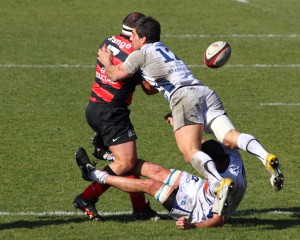FRIDAY, 17 AUGUST 2012
The first sign that concussion can prematurely age the brain by breaking down its signalling pathways has been found by researchers at the University of Michigan. Led by Steven Broglio, the team studied the differences in gait, electrical activity, balance, and impulse control between college students who had a history of concussion and those who had not. Although all the participants had no visible cognitive differences, slight functional declines were found up to six years after injury occurrence.This has led Broglio, in July’s issue of Exercise and Sports Science Reviews, to hypothesise that head impacts may accelerate natural ageing in the brain. Keen to avoid panic, he stresses that this is currently only a hypothesis and concussion is possibly only a small contributor to neural ageing which is also affected by genetics, alcohol consumption, exercise and smoking, amongst other lifestyle choices.
By monitoring the brains of participants as they undertook certain tasks, Broglio found that electrical activation in the brain covered a smaller area in those who had previously suffered concussion than in those who had not.
The signalling pathways in a brain can be compared to a road surface. Over time, the pathway naturally deteriorates due to constant use and traffic consequently slows, leading to our reflexes deteriorating as we age. Concussive impacts, it is argued, may cause the pathways to suffer the neural equivalent of a pothole, thus slowing traffic even more.
Broglio is doubtful that one concussive event will have a considerable impact. "What we don't know is if you had a single concussion in high school, does that mean you will get dementia at age 50?" Broglio said. "Clinically, we don't see that.” The team believe instead that the effect will be cumulative. They plan to investigate the long term effects of concussion by studying people in their 20s, 40s, and 60s who suffered concussion whilst playing sports in their schooldays.
doi: 10.1097/JES.0b013e3182524273
Written by Patrick Kirkham

